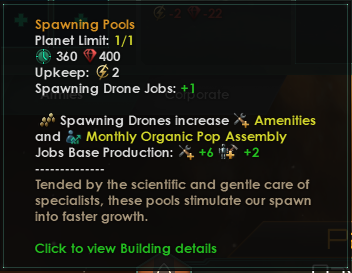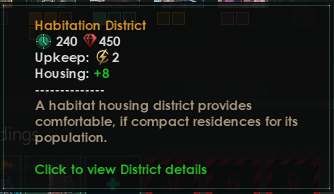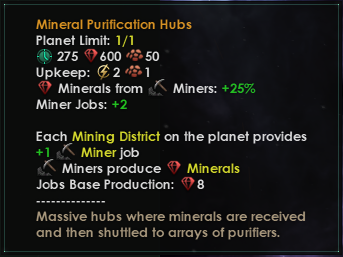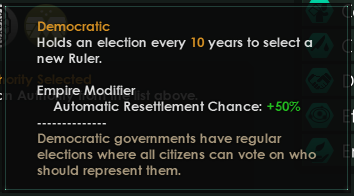Hello!
This week we’re going to look at some more changes we're planning, as well as a review of how some of the experiments mentioned in the last few dev diaries have evolved.
Thank you for the massive amount of feedback in those threads.
Reduction in Pops
Due to the effects on performance and a desire to reduce the micromanagement burden in the mid to late game, some of the things we’ve been deeply looking into are different ways of dramatically reducing the number of pops in the galaxy.
These experiments have generally revolved around modifying the growth (or assembly required) for pops as an empire’s population grows, with some variants trying a logistic pop growth (where growth follows an S-shaped curve as planets develop, based on a carrying capacity of a planet). These experiments have reduced the end date pop count to somewhere around one half of the old numbers with the expected performance improvements.
Organic pops will follow a curve where they begin at standard population growth, increase growth as the approach a midpoint between population and the planetary carrying capacity, then slow down to zero as they reach the top of the curve. Pop Assembly, on the other hand, is generally slow but consistent. The biggest change is that producing a new pop no longer costs a static amount of pop growth - it increases as the empire population does.
A significant reduction in pops has a cascade of major implications for the overall economy, production, and other gameplay effects. As such, these also require a pass on buildings, technologies, and even seemingly minor ripple effects like what the value should be for the trade value generated by pops.
There will be a lot of patch notes.
Most buildings have been standardized to now give 2 jobs per tier rather than the old 2/5/8 progression.

Just one example of many.
We’ve also changed a few buildings to have new or additional features, such as the Spawning Pool and Clone Vats, which have had their Pop Growth modifiers replaced with the new Organic Pop Assembly. This fills the same slot on the planet as Robotic Pop Assembly, so generally you’ll want to pick one or the other. (Clone Vats also picked up a food upkeep cost to represent simple materials to break down.)


Pops is Soylent Green!
A few other jobs got minor perks added to them, like the Medical Workers from Gene Clinics making it a little easier to live on less hospitable worlds.

Doesn't normally produce exotic gas, this one happens to be a lithoid.
And a few new techs have been added to help compensate for lost productivity. One tech line increases both the job production of a planet as well as job upkeep - those fewer pops are still capable of producing the work of more on a developed planet.
Ring Worlds
As part of the balance pass, Ring Worlds have been bumped up to 10 segments from 5, and the jobs per segment have been adjusted.





The Shattered Ring origin now possesses a warning that it may be a Challenging Origin for Lithoids due to a scarcity of minerals, and now also applies the Ring World Habitability Preference to your pops. We’re considering adding a similar warning for Hives selecting the origin, since the habitability preference change puts a serious crimp in their expansion.

Put a ring on it?
Their starting blockers have also been adjusted to give a more balanced spread of jobs.
Ecumenopoleis
Like the Ring Worlds, these start with all building slots open. As mentioned before, you can now use the Arcology Project decision on a planet that has a mix of City and Industrial Districts.
The ecumenopolis has a unique distinction of being able to have both the Factory and Foundry building lines on the same planet.
Habitats
The changes to Habitat modules are much smaller in scope, but here’s the list of their districts.





Void Dwellers have gotten a bit of attention as well with some tradition swaps for those that had minimal or no beneficial effects for them.


Replacing Public Works Division:

And for Void Dwellers with the Adaptability tree:

Interstellar Franchising and Imperious Architecture now also function for Habitats.
Updates to Dev Diary 190
Some of these updates may not be new to people following the forum threads, but it's easy to miss things so I figured we should go over them.
Many people requested the ability to fully specialize their foundry and factory worlds. We've modified the Forge and Industrial World planet designations to shift one pop on each Industrial District to the appropriate job if possible.


We've also upgraded the Food Processing Center, Mineral Purification Hub, and Energy Nexus to provide an extra job to each of their associated resource production districts. (The Food Processing Center will also improve Hydroponics Farms.)



One of the suggestions made in the thread was to add a civic that increases unlocked Building Slots. Sounded like a great addition to Functional Architecture.

Functionality increased!
Updates to Dev Diary 191
We’ve explored some additional options regarding the resettlement system we outlined in Dev Diary 191, and after trying a few things, and have settled on some extensive modifications to the system.
All planets with free sapient unemployed pops that are not locked down by migration controls will have a small chance every month of moving one to another planet within their empire that has jobs that they are willing and able to work, housing, and habitability of 40% or higher. This chance is increased if there are multiple unemployed pops that meet the criteria.
The system now prefers to move higher strata pops first, so rulers and specialists will move before workers, and this system also functions for gestalt empires. It will not relocate non-sapient robots or slaves. It will generally prefer to move pops to the planets with the most free jobs.
After some experimentation we’ve chosen to keep the Transit Hubs as Starbase Buildings that provide a system wide buff to the chance of auto-resettlement occurring. (Rather than being essential to have it occur in the first place.)

Doubles the chance the pops choose to resettle themselves.
Greater Than Ourselves has been rewritten to also massively increase this chance when the edict is active, with a +200% bonus.
We initially had these pops considering destinations available through Migration Pacts as well, but decided against keeping that since it introduced a new Migration Controls micromanagement element that we didn’t find desirable.
We’ve also done a minor update to the Authority bonuses that seemed a little bit weak.


Democracies now have a bonus encouraging their pops to seek their dreams, and Dictatorships have a bit of an easier time holding things together when they’re a bit overstretched.
Closing Thoughts
One other little quality of life improvement that was just added is this filter on the colonization interface.

That’s probably long enough for today. We’re looking forward to your feedback on these as well.
Next week w̷e̵'̸l̸l̴ ̴b̸e̴t̵̮̄ǎ̸͈l̷̠̈k̴͔͂i̴̞͒n̷̪͊g̸̳͗ ̸͚̎a̵͉̐b̵̤̿ȯ̴̲ṵ̵̀t̸͇͂ ҈҂▒©╛⅜
This week we’re going to look at some more changes we're planning, as well as a review of how some of the experiments mentioned in the last few dev diaries have evolved.
Thank you for the massive amount of feedback in those threads.
Reduction in Pops
Due to the effects on performance and a desire to reduce the micromanagement burden in the mid to late game, some of the things we’ve been deeply looking into are different ways of dramatically reducing the number of pops in the galaxy.
These experiments have generally revolved around modifying the growth (or assembly required) for pops as an empire’s population grows, with some variants trying a logistic pop growth (where growth follows an S-shaped curve as planets develop, based on a carrying capacity of a planet). These experiments have reduced the end date pop count to somewhere around one half of the old numbers with the expected performance improvements.
Organic pops will follow a curve where they begin at standard population growth, increase growth as the approach a midpoint between population and the planetary carrying capacity, then slow down to zero as they reach the top of the curve. Pop Assembly, on the other hand, is generally slow but consistent. The biggest change is that producing a new pop no longer costs a static amount of pop growth - it increases as the empire population does.
A significant reduction in pops has a cascade of major implications for the overall economy, production, and other gameplay effects. As such, these also require a pass on buildings, technologies, and even seemingly minor ripple effects like what the value should be for the trade value generated by pops.
There will be a lot of patch notes.
Most buildings have been standardized to now give 2 jobs per tier rather than the old 2/5/8 progression.

Just one example of many.
We’ve also changed a few buildings to have new or additional features, such as the Spawning Pool and Clone Vats, which have had their Pop Growth modifiers replaced with the new Organic Pop Assembly. This fills the same slot on the planet as Robotic Pop Assembly, so generally you’ll want to pick one or the other. (Clone Vats also picked up a food upkeep cost to represent simple materials to break down.)


Pops is Soylent Green!
A few other jobs got minor perks added to them, like the Medical Workers from Gene Clinics making it a little easier to live on less hospitable worlds.

Doesn't normally produce exotic gas, this one happens to be a lithoid.
And a few new techs have been added to help compensate for lost productivity. One tech line increases both the job production of a planet as well as job upkeep - those fewer pops are still capable of producing the work of more on a developed planet.
Ring Worlds
As part of the balance pass, Ring Worlds have been bumped up to 10 segments from 5, and the jobs per segment have been adjusted.





The Shattered Ring origin now possesses a warning that it may be a Challenging Origin for Lithoids due to a scarcity of minerals, and now also applies the Ring World Habitability Preference to your pops. We’re considering adding a similar warning for Hives selecting the origin, since the habitability preference change puts a serious crimp in their expansion.

Put a ring on it?
Their starting blockers have also been adjusted to give a more balanced spread of jobs.
Ecumenopoleis
Like the Ring Worlds, these start with all building slots open. As mentioned before, you can now use the Arcology Project decision on a planet that has a mix of City and Industrial Districts.
Note: Empire has all technologies but no traditions active.








The ecumenopolis has a unique distinction of being able to have both the Factory and Foundry building lines on the same planet.
Habitats
The changes to Habitat modules are much smaller in scope, but here’s the list of their districts.





Void Dwellers have gotten a bit of attention as well with some tradition swaps for those that had minimal or no beneficial effects for them.


Replacing Public Works Division:

And for Void Dwellers with the Adaptability tree:

Interstellar Franchising and Imperious Architecture now also function for Habitats.
Updates to Dev Diary 190
Some of these updates may not be new to people following the forum threads, but it's easy to miss things so I figured we should go over them.
Many people requested the ability to fully specialize their foundry and factory worlds. We've modified the Forge and Industrial World planet designations to shift one pop on each Industrial District to the appropriate job if possible.


We've also upgraded the Food Processing Center, Mineral Purification Hub, and Energy Nexus to provide an extra job to each of their associated resource production districts. (The Food Processing Center will also improve Hydroponics Farms.)



One of the suggestions made in the thread was to add a civic that increases unlocked Building Slots. Sounded like a great addition to Functional Architecture.

Functionality increased!
Updates to Dev Diary 191
We’ve explored some additional options regarding the resettlement system we outlined in Dev Diary 191, and after trying a few things, and have settled on some extensive modifications to the system.
All planets with free sapient unemployed pops that are not locked down by migration controls will have a small chance every month of moving one to another planet within their empire that has jobs that they are willing and able to work, housing, and habitability of 40% or higher. This chance is increased if there are multiple unemployed pops that meet the criteria.
The system now prefers to move higher strata pops first, so rulers and specialists will move before workers, and this system also functions for gestalt empires. It will not relocate non-sapient robots or slaves. It will generally prefer to move pops to the planets with the most free jobs.
After some experimentation we’ve chosen to keep the Transit Hubs as Starbase Buildings that provide a system wide buff to the chance of auto-resettlement occurring. (Rather than being essential to have it occur in the first place.)

Doubles the chance the pops choose to resettle themselves.
Greater Than Ourselves has been rewritten to also massively increase this chance when the edict is active, with a +200% bonus.
We initially had these pops considering destinations available through Migration Pacts as well, but decided against keeping that since it introduced a new Migration Controls micromanagement element that we didn’t find desirable.
We’ve also done a minor update to the Authority bonuses that seemed a little bit weak.


Democracies now have a bonus encouraging their pops to seek their dreams, and Dictatorships have a bit of an easier time holding things together when they’re a bit overstretched.
Closing Thoughts
One other little quality of life improvement that was just added is this filter on the colonization interface.

That’s probably long enough for today. We’re looking forward to your feedback on these as well.
Next week w̷e̵'̸l̸l̴ ̴b̸e̴t̵̮̄ǎ̸͈l̷̠̈k̴͔͂i̴̞͒n̷̪͊g̸̳͗ ̸͚̎a̵͉̐b̵̤̿ȯ̴̲ṵ̵̀t̸͇͂ ҈҂▒©╛⅜



